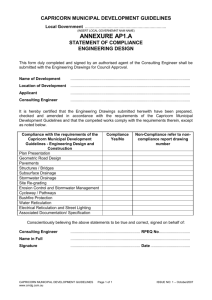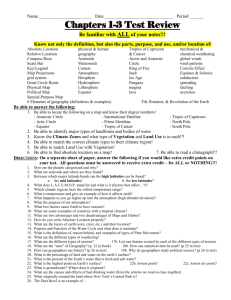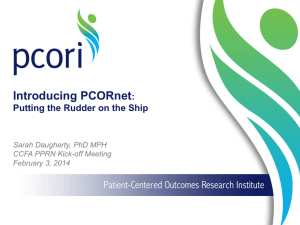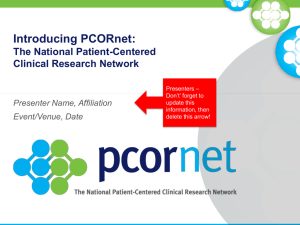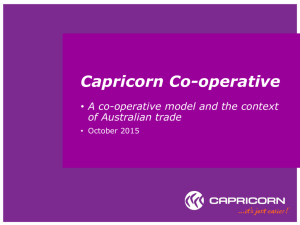Chicago Area Patient Centered Outcomes Research Network
advertisement
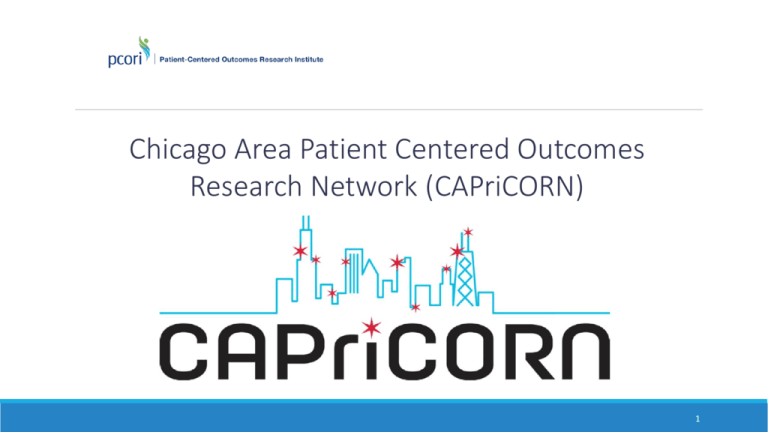
Chicago Area Patient Centered Outcomes Research Network (CAPriCORN) 1 Goals • Rationale for PCORnet • Who is CAPriCORN • What CAPriCORN is expected to do in 18 months ($7M contract) • Health System Leadership Meeting (June 20, 2014 at National Academies of Sciences) 2 Rationale for a National Patient-Centered Clinical Research Network (PCORnet) Current clinical research system – productive, yet oHigh percentage of clinical decisions not supported by evidence oHealth outcomes and disparities not improving oDoes not answer questions that matter most to patients & clinicians oIs not designed to address needs of health systems • Too slow • Too expensive 3 Rationale for PCORnet (continued) Researchers and funders recognize the value in integrating clinical research networks PCORnet goals • Link existing networks to increase efficiency • Ensure patients, providers, and scientists form true “communities of research” • Create “interoperability” – networks can share sites / data 4 29 CDRN and PPRN awards approved on December 17, 2013 by PCORI’s Board of Governors This map depicts the number of PCORI funded Patient-Powered or Clinical Data Research Networks that have coverage in each state. 5 Goals • Rationale for PCORnet • Who is CAPriCORN • What CAPriCORN is expected to do in 18 months ($7M contract) • Health System Leadership Meeting (June 20, 2014 at National Academies of Sciences) 6 Who is CAPriCORN? CAPriCORN Partners: Blue Cross Blue Shield of Illinois ◦ Center for Medical Technology Policy ◦ Chicago Asthma Consortium ◦ Chicago Health IT Regional Extension Center (CHITREC) ◦ Comer Children’s Hospital ◦ Have a Heart for Sickle Cell Anemia Foundation ◦ Illinois Hospital Association ◦ Lurie Children’s Hospital ◦ Next Step/Strive ◦ Office of Health Information Technology ◦ Respiratory Health Association ◦ Sickle Cell Disease Association of Illinois ◦ The Peggy Lillis Memorial Foundation 7 The CAPriCORN team and elected officials kicking off the award. Elected officials: Senator Dick Durbin, Congressman Danny K. Davis, State Senator Antonio Munoz, County Commissioner Robert Steele 8 Steering Committee Members Cook County Health and Hospital System • Bill Trick Hines Veterans Affairs • Brian Schmitt Jesse Brown Veterans Affairs Medical Center • Wendy Brown Loyola Medicine • Fran Weaver NorthShore University HealthSystem • Jonathan Silverstein Northwestern University • Abel Kho Rush University Medical Center • Raj Shah The University of Chicago Medicine • David Meltzer University of Illinois Hospital and Health Sciences System • Jerry Krishnan Alliance of Chicago Community Health Services (FQHC) • Fred Rachman External Research Partner • Tom Concannon PCAC • Madeleine Shalowitz CAPriCORN PI (The Chicago Community Trust) • Terry Mazany CAPriCORN Admin (Illinois Medical District Commission) • John Collins 9 Clinical Data Research Networks (CDRNs) Clinical & Translational Science Awardees 1. Scalable Collaborative Infrastructure for a Learning Healthcare System (Harvard) 2. Mid-South CDRN (Vanderbilt) 3. Patient-oriented Scalable National Network for Effectiveness Research (UCSD) 4. Greater Plains Collaborative (Univ. Kansas Medical Center) 5. Kaiser Permanente & Strategic Partners Patient Outcomes Research To Advance Learning Network (Kaiser Foundation Research Institute) 6. Louisiana CDRN (Louisiana Public Health Institute) 7. National Pediatric Learning Health System (Children’s Hospital of Philadelphia) Health Information Exchanges Safety Net Clinics 8. New York City Clinical Data Research Network (NYC-CDRN) Integrated Delivery Systems 9. Chicago Area Patient Centered Outcomes Research Network (CAPriCORN; Chicago Community Trust) 10. Accelerating Data Value Across a National Community Health Center Network (Oregon Community Health Information Network) 11. Towards a Learning Health System in the Mid-Atlantic Region (Univ. Pittsburgh) 10 Academic Health Centers 10 18 Patient Powered Research Networks (PPRNs) • Teams of patients, advocacy groups, clinicians, academic centers, practice-based research networks • Strong understanding of patient engagement • Significant range of conditions and 10 diseases • Variety of populations represented (including pediatrics, under-served) • 50% focused on rare diseases • Varying capabilities with respect to developing research data • Several PPRNs have capacity to work with biospecimens 11 11 12 12 Goals • Rationale for PCORnet • Who is CAPriCORN • What CAPriCORN is expected to do in 18 months ($7M contract) • Health System Leadership Meeting (June 20, 2014 at National Academies of Sciences) 13 What is CAPriCORN expected to do in 18 mos? Establish procedures for clinical data standardization and interoperability across CDRNs and PPRNs Capture detailed longitudinal information on >1 million patients (~50% non-white) Operationalize a central IRB 14 What? (continued) Recruit and characterize 5 cohorts (asthma, anemia, sickle cell disease, obesity, and recurrent Clostridium difficile) Develop capacity to conduct comparative effectiveness research (CER) trials and observational studies oEngage patients, clinicians & health system leaders throughout research cycle from idea generation to implementation 15 Goals • Rationale for PCORnet • Who is CAPriCORN • What CAPriCORN is expected to do in 18 months ($7M contract) • Health System Leadership Meeting (June 20, 2014 at National Academies of Sciences) 16 Comments from C-suite (some) Opportunities oInformation from clinical practice to drive the cycle of continuous performance improvement oPath towards becoming a “learning health care system” Challenges oDistracts health systems from an already full agenda oData privacy / HIPAA oIndemnification 17 Health System Leadership Meeting June 20, 2014; Washington, D.C. Topic Health System Leaders Working Towards High Value Care Through Integration of Research and Practice Location The National Academies of Sciences Building 2101 Constitution Ave NW Washington, DC Goals 1. Value proposition for integrating practice and research 2. Practical agenda and infrastructure alignment 3. Advancing progress 18 Discussion Next steps 19 18 Month Organizational Goal 20 Operational Structure 21
